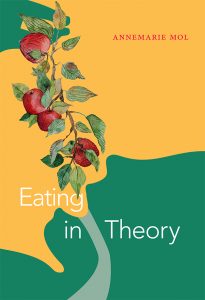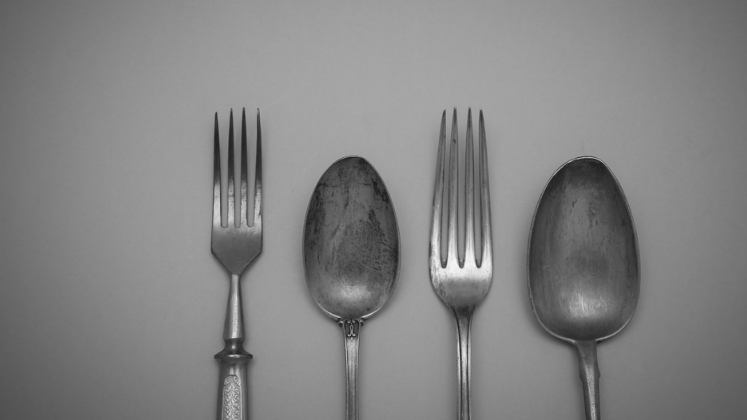In Eating in Theory, Annemarie Mol offers a new philosophical theory of eating, exploring how the transformative entanglements of eating invite us to rethink what it means to be human. This beautifully written book is a tasty and satisfying treat for anyone interested in human-nature relationships, refreshing theoretical perspectives, food studies, ethnography and more, finds Ola Płońska.
Eating in Theory. Annemarie Mol. Duke University Press. 2021.
 Find this book (affiliate link):
Find this book (affiliate link): ![]()
In the midst of increasing climate disasters and a global pandemic, Annemarie Mol’s newest book, Eating in Theory, has arrived at an opportune moment. Mol’s book confronts readers with the complexities of living in the era of the Anthropocene, when humans elevate themselves above ‘nature’. She shows what we can, and should, learn from eating.
Mol is a Dutch ethnographer who works at the intersection of philosophy and anthropology with a focus on the body and embodiment. She is well-known for her work on post-Actor Network Theory and feminist understandings of technology, medicine and science. In Eating in Theory, Mol discusses the practices of eating to argue for new theoretical terms that describe the realities of environmental destruction. She suggests that the terms we currently use elevate thinking and talking above eating and nurturing, hence giving ‘the human’ a superior role in the debate. With this observation she actively interferes in the ‘Western philosophical tradition’ as she proposes alternative understandings of being, knowing, doing and relating by using eating as presenting exemplary situations with which to think.
Each chapter of the book starts with a humanistic example of eating as part of its larger theoretical framework, drawing on the perspectives of different philosophers. ‘[Hannah] Arendt considered eating to be a distraction from more worthwhile endeavors; for [Maurice] Merleau-Ponty, it was a banal precondition for cognition; [Hans] Jonas took it to be a life-affirming activity on which nobler pursuits could be grounded. [Emmanuel] Levinas, by contrast, cherished eating’ (105). Mol serves the reader stories which demonstrate how this anthropocentric or humanist line of thinking does not account for or accommodate various human experiences of eating. ‘What if we were to stop celebrating ‘‘the human’s’’ cognitive reflections about the world, and take our cues instead from human metabolic engagements with the world? Or, to put it differently: What if our theoretical repertoires were to take inspiration not from thinking but from eating?’(3)

Image Credit: Image by 8992438 from Pixabay
Eating in Theory is a small but extremely valuable and beautifully written book on the philosophical theory of eating. The author brings theory to life through many personal anecdotes: from cooking dinner at home, to grocery shopping, to biophysical eating experiences to stories of eating at healthcare institutions and groups for weight loss.
In the latter, Mol describes a situation in which participants that want to lose weight have to learn to ‘perceive food attentively’ by eating a chocolate truffle. The truffle has to be looked at, smelled, touched, tasted. Through this exercise the coach wants to teach the participants how to be satisfied by food through close attention. This sense of satisfaction will allow a person to feel if they have eaten enough. ‘Sensations of the body result not only from encountering food and eating it, but also from lacking it and needing it. The coach addresses this and encourages her clients not only to realize when they have eaten enough, but also to attend to their hunger’ (59). Through this example Mol demonstrates a lesson about knowing. A person who knows how to pay attention while eating learns about the food that it is only applicable in relation to her body. A body which will then tell you when enough is enough.
With her talent for seemingly simple statements, through eating Mol is able to offer a very different model of being. She does this by demonstrating Merleau-Ponty’s idea of walking. Mol describes how Merleau-Ponty’s subject could walk around an apartment as long as the neuromuscular body is working well. Then the body works as an integrated whole and is distinct from its surroundings. This avoids the body from bumping into chairs and tables. But when looking at the eating I, the composition changes. When eating, one incorporates bits of one’s surroundings into the body by swallowing them. ‘As an eater I am externally entangled and internally differentiated. What kind of being is that?’ (40). Therefore, while a walking body hangs together as a whole, an eating body is spatially differentiated. Different body parts react differently to foods: the stomach welcomes cookies, the lungs do not. ‘In eating then, I am a semipermeable, internally differentiated being, getting enmeshed in intricate ways with pieces of my surroundings’ (36).
Mol prioritises practice over theory, motivating the reader to look at practices instead of trying to ‘do theory’ as a grand scheme, which enables us to catch reality as it is. ‘If ‘‘theory’’ opens and closes ways of thinking, the question arises as to what the theoretical repertoires currently prevalent in academia help to articulate — and what they silence’ (2). Through everyday stories of eating from all over the world — post-socialist China, the Samburu people in Northern Kenya, Spanish colonisation of South America, Merleau-Ponty’s life in post-war France and many more — Mol insists that we look at the practices of eating and make theory more fluid, which can help us elucidate what is going on in very concrete everyday situations.
By using the Spanish colonisation of Latin America as an example, Mol shows how aligning eating with being is not always inherently good. During the period of colonisation, Spaniards used the supposed ‘poor taste’ (46) of the indigenous population, which meant eating foods like spiders or human flesh, to demonstrate their ‘uncivilised’ status. Attributing a lack of civilisation to the indigenous population made overpowering them and colonising their lands acceptable to the Spanish. Therefore, in the Latin American context of colonisation, the saying ‘you are what you eat’ suggests a strong division between ‘wheat-eating overseers and insect-eating people in need of oversight’ (46).
Mol steps away from the Western philosophical tradition that is still marked by hierarchies and emphasises the effect these hierarchies have on the environment and earth we live on. For example, through relating, we like to call some animals, like dogs, our companions. The word ‘companion’ comes from the Latin words ‘cum panis’ – with bread. It refers to those whom we share our food with. Those we consume, we do not share our dinner table with. But eating others also contributes to the survival of their species – for instance, farm animals – as their existence depends on our need to eat them. So whilst taking food is generative, the giving part is self-serving. Mol explains that when looking at this through the model of relating, our winning over others by eating them, erodes the ‘conditions of possibility on which my life depends’ (143).
Her lesson for relating is that all this ‘winning’ that humans do is self-defeating. When it comes to our current food consumption, we are wiping out others and with that our own living environment. ‘Given the current state of eating, better ways of attuning to other creatures and the earth we share are direly needed’ (137). Eating in Theory is a tasty and satisfying treat for anyone interested in human-nature relationships, refreshing theoretical perspectives, food studies, ethnography and more. This book certainly does not offer any empty carbs, but rather proper nutrition for the brain.
- This review first appeared at LSE Review of Books.
Please read our comments policy before commenting.
Note: This article gives the views of the author, and not the position of USAPP – American Politics and Policy, nor of the London School of Economics.
Shortened URL for this post: https://bit.ly/3ih4Fg4
About the reviewer
Ola Płońska – VU University of Amsterdam
Ola Płońska is a PhD candidate in Anthropology at the VU University of Amsterdam. In the past she has conducted research in Cuban urban gardens and written the book ‘The Urban Gardens of Havana’ (2019). For her PhD research she focuses on the construction and deconstruction of masculinities in the private and public sphere in the Netherlands, specifically focusing on men who search for new meaning when it comes to ‘being a man’ by attending various men’s groups, circles and other male spaces.



